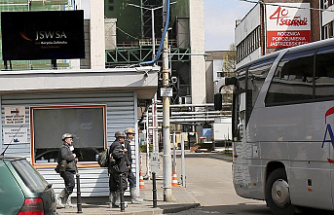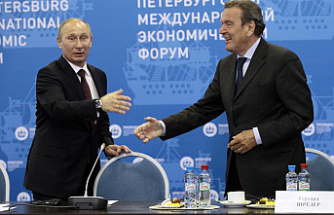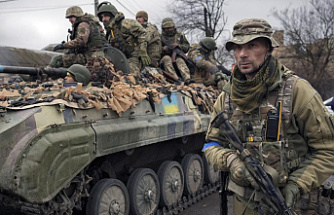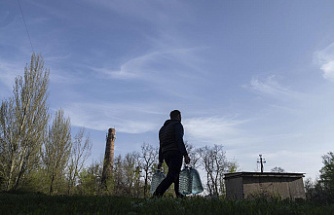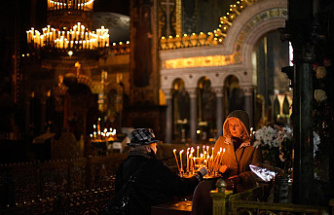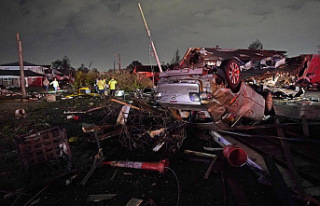Russia's top diplomat warned against starting World War III and stated that the threat of nuclear conflict "shouldn't be underestimated."
Meanwhile, the U.S. moved to send more weapons to Ukraine and claimed that the Western allies are making a difference to the 2-month-old conflict.
Russia is failing. "Ukraine is succeeding," U.S. Secretary of State Antony Blinken stated, one day after he and U.S. defense secretary made bold visits to Kyiv to meet President Volodymyr Zilenskyy.
Blinken stated that Washington approved a $165 million sale ammunition -- non-U.S. ammunition, mainly for Ukraine's Soviet-era weaponry -- and will also provide over $300 million in financing to purchase more supplies.
U.S. Defense secretary Lloyd Austin added to his remarks, saying that while the U.S. wants Ukraine to remain a sovereign democracy, it also wants Russia to be "weakened to the point it can't invade Ukraine."
Austin's remarks about Russia weakening seemed to reflect a shift in U.S. strategic objectives. The U.S. had previously stated that its goal with military aid was to assist Ukraine in winning and to defend NATO members against Russian threats.
Russian Foreign Minister Sergei Lavrov stated that weapons supplied by Western countries will be "legitimate targets," and added that Russian forces have already attacked weapons warehouses in western Ukraine.
In a broad interview with Russian television, Lavrov stated that "everyone is reciting incantations which in no case can be allowed World War III." In a wide-ranging interview on Russian television, Lavrov accused Ukrainian leaders and NATO of asking them to join the conflict.
According to the transcript found on the Russian Foreign Ministry website, NATO forces "pour oil on the fire" by providing weapons.
Lavrov stated that he would not like to see the risk of nuclear conflict artificially increased now, as the risks are quite significant.
He said, "The danger is grave." It is real. It shouldn't be underestimated."
The goal of Russia's invasion of Ukraine on February 24th was to capture Kyiv, its capital. With the aid of Western weapon, the Ukrainians stopped the invasion and forced President Vladimir Putin's troops back to their base.
Moscow is now stating that its goal is to seize the Donbas, a predominantly Russian-speaking region in eastern Ukraine. Both sides acknowledge that the campaign in the East is under way, but Russia has not yet mounted an aggressive ground offensive and has not made any significant breakthroughs.
Russia aimed its firepower at Ukraine on Monday with warplanes and missiles striking far beyond the frontlines in an attempt to stop Ukrainian attempts to gather supplies for the fight.
Oleksandr Kamyshin (head of Ukraine's state railroad) said that five stations were damaged in central and west Ukraine. One worker was also killed. A missile attack was launched near Lviv, a western city that is close to the Polish border. This area has been populated by fleeing Ukrainians.
According to Ukrainian authorities, at least five people were killed in Russian strikes in central Vynnytsia.
According to Maj. Gen. Igor Konashenkov, a Russian Defense Ministry spokesperson, Russia also destroyed a Kremenchuk oil refinery and fuel depots in central Ukraine. He stated that Russian warplanes had destroyed 56 targets in Ukraine overnight.
Philip Breedlove (a former U.S. General who served as NATO's top commander between 2013 and 2016) said that the recent strikes against fuel depots were part of a strategy for depleting key Ukrainian war resources. He said that the strikes against rail targets are a more recent tactic.
He said that he believed they were doing it to stop supplies from reaching the front. "The illegal reason is that they know people are leaving the country and that this is an intimidation tactic or terrorist tactic to make them doubt their ability to travel on the rails."
Phillips P. O'Brien is a professor of strategic studies at University of St. Andrews in Scotland. He said that the war has settled into an incremental campaign of battlefield losses and gains.
He said that "The two sides are kind of every day weakening one another." "So it's a matter of what can be brought in that's fresh" and "what can be destroyed on the other side."
Transnistria is a separatist region of Moldova, which lies along the Ukrainian border. Several explosions were believed to have been caused by rocket-propelled bombs and landed at the Ministry of State Security. No immediate claims of responsibility were made or injuries reported. Transnistria, a small area of land that is home to approximately 470,000 people and a total of 1,500 Russian troops, can be described as a region.
According to Moldova's Foreign Ministry, "the purpose of today's incident was to create pretexts to strain the security situation in Transnistrian." The U.S. has warned that Russia might launch "false flag" attacks against its side in order to give the United States a pretext to invade other countries.
Rustam Minnkayev, a Russian military commando, stated last week that the Kremlin wants total control over southern Ukraine. This would allow Transnistria to open.
The estimated 2,000 Ukrainian troops that are currently residing in the steel plant at Mariupol, a strategic port city in southern Russia, are trying to hold back the Russian offensive and tying down Russian forces. To dislodge these holdouts, Russian forces launched airstrikes against the Azovstal steel plant over the weekend.
According to reports, around 1,000 civilians were sheltering at the steelworks. The Russian military promised to open a humanitarian corridor Monday to allow them to leave.
Ukraine was skeptical of the Russian offer. Iryna Vereshchuk, Deputy Prime Minister, stated on Telegram that Ukraine doesn't consider the route safe. She also said that Russia has broken agreements regarding similar evacuation routes in the past. She urged the United Nations to supervise an evacuation.
Mariupol's mayor and city council said that a new mass grave was located 10 km (6 miles) north-east of the city. Mayor Vadym Bouchenko stated that authorities are trying to determine the exact number of victims. This was the third mass grave found in Russian-controlled areas close to Mariupol within the past week.
Over the past two years, Mariupol was devastated by intense street fighting and bombardment. The Russians would be able to capture the city, which would not only free them but also make Ukraine lose a crucial port. This would allow Moscow to create a land corridor to reach the Crimean Peninsula. Russia seized the Crimean Peninsula from Ukraine in 2014.
Zelenskyy stated in his nightly video address that Russia is stealing its resources and his country wants to resist the occupation.
One top Ukrainian official questioned the possibility of further negotiations between the two countries. The last sessions in Istanbul were unsuccessful earlier this month.
Dmytro Kuleba, the Ukrainian Foreign Minister, stated to The Associated Press that no negotiations would be possible if there were not talks between Zelenskyy or Putin.
Britain claimed that 15,000 Russian troops were killed in Ukraine since Moscow invaded. Defense Secretary Ben Wallace stated that 25% of Russian combat units sent in Ukraine were "not combat effective".
According to Ukrainian officials, about 2,500-3,000 Ukrainian soldiers had been killed by the time of mid-April.


